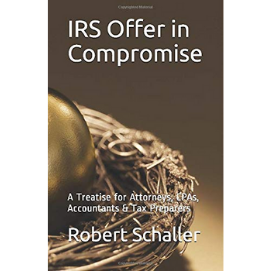IRS Tax Relief Provides Offer in Compromise Solution
A prime IRS tax relief solution is the IRS Offer in Compromise program. The IRS Offer in Compromise program should be explored by taxpayers who are unable to pay the full tax liability. This program is frequently advertised on TV and radio as the “Fresh Start Initiative.” As explained in detail in this website, an Offer in Compromise is an agreement between a taxpayer and the IRS that resolves a taxpayer’s tax liability by payment of an agreed upon reduced amount. The total payment amount is NOT a percentage of the total tax liability; instead, it is calculated by an IRS formula based on a taxpayer’s current equity in assets plus future net income. Thus, the total payment amount varies with each taxpayer since each taxpayer’s financial wherewithal is unique. Before an offer can be considered, a taxpayer must have filed all tax returns, made all required estimated tax payments for the current year, and made all required federal tax deposits for the current quarter if the taxpayer is a business owner with employees. Taxpayers in an open bankruptcy proceeding are not eligible.
An Offer in Compromise is an offer made by the taxpayer to the IRS to enter into a contract “in which the IRS agrees to accept an amount different from what the taxpayer owes in taxes.” Begner v. United States, 428 F.3d 998, 999 (11th Cir. 2005); see also 26 C.F.R. § 601.203. Taxpayers seeking to make an OIC must submit a Form 656 to the IRS pursuant to 26 C.F.R. § 601.203(b). Any compromise of a tax liability by the IRS must be made “prior to reference [of the matter] to the Department of Justice ([‘DOJ’)] for prosecution or defense.” 26 U.S.C. § 7122(a). There are three grounds for such a compromise: (1) doubt as to collectibility; (2) promotion of effective tax administration; and (3) doubt as to liability. 26 C.F.R. § 301.7122-1(b). Offers that are considered on the ground of promoting effective tax administration are also referred to as ETA Offers. IRM § 5.8.11.1(1) (08-05-2015).
Doubt as to Collectibility Is the Most Common Form of Offer in Compromise
“Doubt as to Collectibility” is the most common form of Offer in Compromise for IRS tax relief. An Offer in Compromise based on Doubt as to Collectibility is only available to a taxpayer when the taxpayer cannot repay the past due taxes IN FULL before the expiration of the collection statute expiration date. 26 C.F.R. § 301.7122-1(b)(2). The IRS analyzes the taxpayer’s ability to pay from the combination of asset sales and future income.
Doubt as to Liability
An Offer in Compromise based on “Doubt as to Liability” only exists where there is a genuine dispute as to the existence or amount of the correct tax liability under the law. 26 C.F.R. § 301.7122-1(b)(1). Doubt as to liability does not exist where the liability has been established by a final court decision or judgment concerning the existence or amount of the liability.
Effective Tax Administration is a form of Offer in Compromise
The IRS may accept an “Effective Tax Administration” (“ETA”) Offer if “the Secretary determines that, although collection in full could be achieved, collection of the full liability would cause the taxpayer economic hardship within the meaning of [26 C.F.R.] § 301.6343-1.” 26 C.F.R. § 301.7122-1(b)(3)(i). There are a number of non-exclusive factors that support a finding that collection would cause economic hardship for purposes of an ETA Offer: (a) the taxpayer is incapable of earning a living because of a long term illness, medical condition, or disability, and it is reasonably foreseeable that the taxpayer’s financial resources will be exhausted providing for care and support during the course of the condition; (b) although the taxpayer has certain monthly income, that income is exhausted each month in providing for the care of dependents with no other means of support; and (c) although the taxpayer has certain assets, the taxpayer is unable to borrow against the equity in those assets and liquidation of those assets to pay outstanding tax liabilities would render the taxpayer unable to meet basic living expenses. 26 C.F.R. § 301.7122-1(c)(3)(i).
Complicated? You bet.
You should have a tax attorney on your side. Don’t battle the IRS without the guidance and support of a qualified tax lawyer. Tap into Attorney Schaller’s 37+ years of legal experience. He wrote the book on erasing or reducing IRS back-taxes. Learn more about IRS offer in compromise.
Contacting the Schaller Law Firm is free. IRS Tax problems can seem daunting and overwhelming. Getting a free Q&A consultation is the perfect place to start. Book an appointment with the convenient online booking system.

